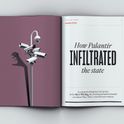The summit of ambition
There is a hint of desperation in Fiona Harvey’s attempt—before COP26 had started—to put any absence of a global deal on climate change on Boris Johnson’s shoulders. As the summit gets under way some realism is required.
Britain happens to be hosting the event but on climate issues we are a minor player, accounting for less than 1.5 per cent of global emissions. We have limited power to tell others what to do. We may extract promises but that does not mean they will be met.
No British prime minister, however detailed their knowledge of and commitment to the green agenda, could align the divergent interests and policies of China, India, Australia, Brazil and the European Union. Whatever pledges emerge will not change that structural fact.
Joe Biden is having enough trouble settling an agreed policy in one country. For some others, climate is top of the agenda. For others it is, rightly or wrongly, a second- or third-order concern, behind such topics as development, terms of trade and national security.
The outcome of COP26 will be imperfect—a full-scale global deal is surely beyond reach and probably always was. The whole UN climate framework is overblown and carries a whiff of the League of Nations—a worthy endeavour, in effect, to create a world government.
There will be some progress, and some coalitions will form behind constructive policies. Some countries and some companies will be encouraged to invest in the science and technology that will produce solutions. Johnson’s contribution will be to have kept the issue on the global agenda. It is easy to sneer, but even that limited outcome will be better than nothing.
Nick Butler, founding chair of the Policy Institute at King’s College London
Fiona Harvey's excellent report on the upcoming Glasgow summit was typically thorough and bleak. However, I fear that the article may be a victim of the same "Great Man of History" delusion that her prime ministerial subject is suspected of falling for.
The article rightly sees serious flaws in the UK government’s preparations for COP26, particularly when set against the energetic efforts of France’s François Hollande in 2015. It is far from ideal that successive UK governments have failed to raise fuel duty for decades, or that the current one has flirted with restarting coal mining in Cumbria. But, more than UK policymaking snafus, it is the broader crisis roiling energy markets that provides far stronger grounds for pessimism.
Globally, there is a scramble for any possible source of energy in the face of a sudden shortage. Voters willing to tolerate considerable disruption in the face of a pandemic are far less willing to forgive blackouts and price spikes, leading to governments everywhere contemplating measures directly inimical to the environmental cause. Rishi Sunak used his Budget to make it cheaper to fly within the UK, and China is ordering its coal mines to boost output.
Long term, the answer must be ever less reliance on fossil fuels to power our economies. In the immediate term, however, I doubt that any amount of prime ministerial determination can rally his fellow leaders against the forces of the market and political self-interest. If this autumn marks a backward step for efforts to address climate change, it is fairer to blame those than the presumed negligence of Prime Minister Johnson.
Giles Wilkes, senior fellow, Institute for Government
Share the wealth
In principle, my friend Deirdre McCloskey is right: why begrudge a billionaire a yacht? Compared to the other sorts of damage billionaires can do, their toys are merely symbols of a fat wallet and a small mind.
But Deirdre’s dream billionaire is all business, remote from politics. Ay, there’s the rub. Real life is different. Adam Smith said it best: “wealth is power, as Mr Hobbes says.” Keep the boys on their boats and keep them away from the Wall Street Journal and the Washington Post, and don’t let them censor Facebook and Google. Selling an internet service is fine; dictating the flow of news is not and—alas—we’re already far over that line.
It is happily true that even billionaires are mortal. But Deirdre omits the sad fact that they can inflict their children on our children. To democracies, dynasties are dangerous; the right remedy is a tough estate-and-gift tax, giving inescapable incentives to philanthropy. If fear of death can ensure that recycled wealth gives life to music, art, education and healthcare—in that case, well, I’m perfectly prepared to pretend to be grateful.
James K Galbraith, economist
Divide and rule
Steve Richards is absolutely right to say that prime ministers are often more secure than they seem. I would add another factor to his list of reasons why: a PM’s ability to divide and rule.
Richards notes that Roy Jenkins decided not to challenge Harold Wilson in the late 1960s because he feared losing to James Callaghan, who would have thrown his own hat in the ring. But what really helped Wilson was that the hatred between Jenkins and Callaghan was mutual. Long after he ceased to be an active politician, Callaghan confirmed to me that the only reason he did not challenge Wilson was his fear of losing to Jenkins.
For both men, the consequence of losing was that their rival might eject them from the Cabinet and send them to the backbenches. As it was, Wilson remained PM, Jenkins remained chancellor and Callaghan remained home secretary. As long as the two men who might have taken over (as Callaghan eventually did in 1976) feared each other more than they hated Wilson, the prime minister was safe. Had either Jenkins or Callaghan departed the stage, or suffered a collapse in popularity within the Labour Party that left the field clear for the other, Wilson might well have been forced from office.
Wilson, like so many PMs, found that he could watch on while his potential challengers cancelled each other out.
Peter Kellner, former president of YouGov
Counts for something
The point of the census depends on whom you ask and when. Censuses tell us things about ourselves that may confirm our suspicions. They also tell us some shockers.
But one crucial—and often overlooked—aspect is that censuses are invaluable for business. Billions of pounds’ worth of investment decisions rest on data thrown up by them.
When ministers proposed ending the census in 2012 and replacing it with a more limited survey, some of the loudest opposition came from business groups. How do telecoms providers know where to lay high-speed broadband? The census can show population densities that make installation worthwhile. When a new supermarket opens on the high street, how does it know whether to stock more Polish foods or more halal goods? Census results can be broken down into six-digit postal code sections. A quick look at which languages those living nearest the new shop report to speak will help answer the question.
For all the expense and effort of carrying out censuses, they serve a crucial purpose.
Norma Cohen, former FT demography correspondent
In his article on the census, David McAllister quips that Austrian seamen might have come to Victorian Britain because their home was landlocked. Although modern Austria has no coastline, the contemporary Austrian Empire had extensive access to the sea round the Adriatic coast. We have only to consult that well-known historical source The Sound of Music to learn that up until the First World War there was an Austrian navy, and presumably also a merchant navy.
Neil MacFarlane, Edinburgh
Planning failure
John Kay is right. The solution to the UK’s sclerotic planning system is to empower and incentivise local leaders to build homes, not to pursue development by diktat from Whitehall.
The UK is unusual among comparable countries, such as France and the Netherlands, in denying local leaders spatial planning powers and preventing local government from capturing any of the uplift in land value associated with the change in its use, which it could then use to pay for the infrastructure and improvements to the public realm that might assuage local protesters. Indeed, there is no explicit link between local progress on housebuilding, which many communities don’t want, and the things they do want, such as infrastructure investment.
As a consequence, local authorities have no incentive to masterplan housing, for example by densifying cities or creating 1960s-style new towns, and instead stick to the passive model of housebuilding that people most resent—incremental development on greenfield land on the edge of towns and villages. Meanwhile, areas that refuse to accept new development to meet rising demand can still benefit from shiny new infrastructure. It is no surprise that we end up as a country of nimbys.
Will Tanner, former adviser to Theresa May and director, Onward
The new snowflakes
“Surely white folks aren’t that fragile.” So ends Diane Roberts’s excellent piece on the debate raging around the National Trust’s decision to notice—at last!—the role of colonialism in the making of British wealth.
Of course Roberts knows that, yes, white folks really are awfully fragile, and she craftily employs the word “cancel” to describe the efforts of conservatives on both sides of the Atlantic to erase references to history that don’t suit their rosy nostalgia.
Apparently when groups such as the Tennessee-based Moms for Liberty lobby for the removal of books from the state’s public school system, that’s not cancel culture, it’s standing up for decency. In an earlier era, when Mary Whitehouse went after television stations in the UK for nudity and foul language, that wasn’t intolerance, it was upholding public morality.
Free speech, it seems, works only in one direction. Roberts offers a timely and important warning; if you really care about freedom of speech, name the attack from the right for what it really is: cancel culture swathed in the language of common sense. This is the seed from which authoritarianism grows.
Philippa Levine, historian of empire
Owned locally
Sebastian Payne’s profile of Tees Valley mayor Ben Houchen refers to Houchen’s “thoroughly pragmatic pledge to nationalise the struggling local airport.” What Houchen has done, however, is to municipalise it. In this he has followed in a proud tradition of municipal enterprise, pioneered in Victorian times before nationalisation was on the agenda and pursued by politicians of all stripes. It’s unfortunate that, even in a piece about a mayor, the continuing role and potential of local government is too often obscured.
David Griffiths, Huddersfield
Cosmic colonialism
Like the astronomer royal Martin Rees, I am enticed by the prospect of walking on Mars and hold reservations about its feasibility.
Rees persuasively argues that it would be preferable for humans to remain earth-bound and instead deploy robotic explorers, an idea initially proposed by the computer pioneer John von Neumann in the mid-20th century. If the robots could replicate themselves after landing, they would multiply and could survey the entire cosmos within a few million years.
But while Rees emphasises the economic benefits of mechanical space travel, it would entail further costs that he ignores. Even deciding where to go is expensive: the cost of construction of the Extremely Large Telescope he mentions is estimated at $1.5bn. Perhaps that money might be better spent reducing child poverty, or improving global health, or widening educational access? And then there are environmental effects to consider. Every rocket launch creates a massive carbon footprint as well as releasing particulates and toxic chemicals—and space junk is already accumulating.
Of course, if Europeans had never had the temerity to venture across the oceans, they would not have found the Americas or Australia. On the other hand, their imperial record suggests that any extraterrestrial life might be better off without us.
Patricia Fara, historian of science
In fact
In the UK, you’re more likely to be a victim of online fraud than any other crime: £754m was stolen in the first six months of this year, up 30 per cent on the same period in 2020.
Reuters, 14th October 2021
Each year, the Moon moves about an inch and a half further away from Earth.
Atlantic, 30th September 2021
Out of 50,000 public monuments in the US, some 170 (less than 0.5 per cent) were taken down in the wake of George Floyd’s death.
National Geographic, 29th September 2021
The youngest EU leader is Finnish prime minister Sanna Marin, who is 35; she is also the youngest globally after Giacomo Simoncini, joint captain regent of San Marino, who is 26.
@AmIRightSir, 9th October 2021
In the week following R Kelly’s conviction for child sexual exploitation, kidnapping and racketeering, his album sales rose by 517 per cent.
Rolling Stone, 8th October 2021
Almond milk was first mentioned in A Baghdad Cookery Book (1226). By 1390, it had reached Europe and was popular during Lent.
Rapid Transition Alliance, 8th September 2021
Between April and September, the average temperature at the Amundsen-Scott South Pole Station was minus 61 degrees Celsius, the coldest since records began in 1957.
Washington Post, 2nd October 2021
There are over three million people of South Asian descent in the UK; only 11 of them have ever played professional football in England.
Independent, 6th October 2021
More than five times as many skyscrapers have been built since 9/11 than existed before; 86 of the 100 tallest buildings in the world have been constructed since 2001.
Guardian, 18th October 2021
The French, Spanish and Italian languages are nominally regulated by a national academy of writers and academics. The Royal Society convened a committee for English in 1665 but its members only met a few times before a plague outbreak stopped them, ending the idea.
Lapham’s Quarterly, 24th August 2021













